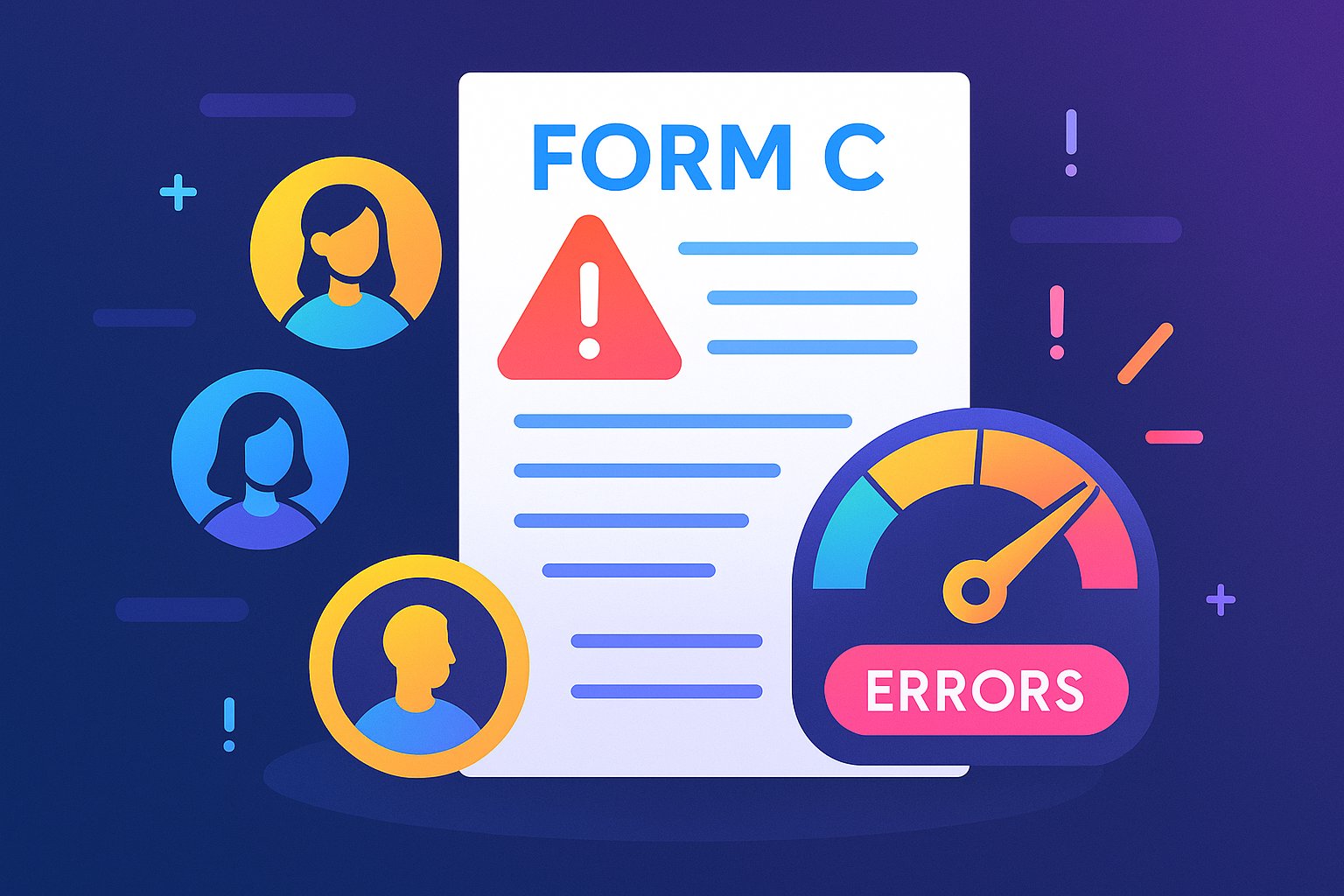The Critical Role of Form C Accuracy
In the world of equity crowdfunding under Regulation Crowdfunding (Reg CF), Form C serves as the foundational disclosure document that informs potential investors about an issuer’s business, financial health, and the terms of the offering. File it correctly, and you establish credibility, satisfy SEC requirements, and trigger the fundraising engine that brings community capital into your venture. File it incorrectly—or worse, neglect to file important information—and the consequences ripple across legal, financial, and reputational dimensions, undermining both your current campaign and future capital-raising opportunities. From enforcement actions and fines to investor lawsuits and platform delisting, the stakes of Form C accuracy could not be higher.
This article gets deep into what happens when you don’t file your Form C correctly. We explore the SEC’s enforcement mechanisms, potential civil and criminal penalties, investor litigation risks, and the operational setbacks that can stall or even halt your raise. Equally important, we examine the erosion of investor trust and how noncompliance can damage your brand long after dollars are returned. Finally, we offer practical guidance on remediation steps and best practices for ensuring your Form C not only meets regulatory standards but also strengthens your relationship with the very backers you seek to engage. By understanding the full spectrum of consequences tied to Form C missteps, founders can adopt a proactive compliance mindset that turns accurate disclosures into a strategic advantage.
Understanding Form C and Its Regulatory Purpose
Form C is more than a bureaucratic formality: it encapsulates every material aspect of your crowdfunding offering. Under Reg CF, issuers must file Form C with the SEC and the funding portal or broker-dealer hosting the campaign before accepting any investments. The document requires detailed disclosures about the company’s business operations, financial statements, officers and directors, target raise amount, use of proceeds, and risk factors. These disclosures promote transparency, deter fraud, and empower non-accredited investors with critical information to assess potential risks and returns. When executed properly, Form C fosters a level playing field, allowing retail investors to participate in private offerings with confidence comparable to institutional participants. Conversely, inaccurate or incomplete Form C filings undermine this regulatory purpose, exposing both issuers and investors to avoidable hazards.
SEC Enforcement Actions and Monetary Penalties
The SEC takes Form C compliance seriously. Failure to file Form C correctly can trigger an SEC investigation and potential enforcement action. If discrepancies emerge—whether omissions of material risks, misstatements of financial data, or failure to update amended filings—the SEC may levy civil penalties against the issuer and, in egregious cases, against individual officers or directors responsible for the misconduct. Civil fines can range from tens of thousands to millions of dollars, depending on the severity of the violation, the issuer’s size, and the degree of investor harm. In particularly flagrant scenarios involving deliberate misrepresentation or fraudulent intent, the SEC can pursue injunctions preventing the issuer from raising further capital under Reg CF and, in extreme cases, refer matters for criminal prosecution. The financial and reputational costs of SEC enforcement can be devastating, underscoring the imperative of meticulous Form C accuracy.
Investor Lawsuits and Civil Liability
Beyond regulatory penalties, issuers face direct civil liability to investors harmed by inaccurate Form C disclosures. If backers can demonstrate that they relied on false or incomplete information when making investment decisions, they may pursue claims for rescission—seeking the return of their invested capital plus interest—or damages for losses incurred. Class-action lawsuits can compound these liabilities when a large cohort of investors bands together, amplifying legal fees, settlement amounts, and reputational damage. Even if an issuer prevails in litigation, the process itself drains resources and distracts management from core business operations. To mitigate these risks, issuers must approach Form C preparation with the same rigor they apply to audited financial statements, ensuring that every figure, projection, and risk narrative withstands legal scrutiny.
Platform Consequences: Delisting and Funding Holds
Crowdfunding platforms act as gatekeepers for Reg CF offerings; they have a vested interest in maintaining their reputations and compliance records. If an issuer’s Form C is found deficient—whether through internal platform review or external complaint—the platform can suspend the campaign, place a hold on incoming investments, or delist the issuer entirely. A suspended campaign halts the momentum built through marketing and community engagement, often resulting in missed funding targets and backer frustration. Delisting is even more severe: it prevents the issuer from relaunching on that platform without rectifying deficiencies and can trigger refund processes for existing commitments. For many startups, a single high-profile delisting incident can close off major crowdfunding channels and signal to other platforms a pattern of noncompliance.
Operational Delays and Increased Costs
Incorrect Form C filings often necessitate corrective filings or amendments, each accompanied by filing fees and administrative overhead. Amending a Form C can require legal counsel, accountants, and investor relations support to revise financial statements, restate risk factors, or adjust offering terms. These corrective measures introduce operational delays—funds cannot be accepted during the amendment process—and erode the carefully timed marketing campaigns designed to drive backer commitments. Moreover, frequent amendments can signal instability or poor governance to potential investors, further undermining fundraising efforts. The cumulative effect is an increase in fundraising costs, both in hard dollars and lost opportunity, emphasizing the importance of getting Form C right the first time.
Reputational Harm and Erosion of Investor Trust
Crowdfunding success depends heavily on community trust. Backers engage not only for potential financial returns but also to support founders whose transparency and integrity they believe in. When Form C errors come to light—especially those involving misrepresented progress, financial instability, or undisclosed material events—backers can feel betrayed. Negative reviews and social media commentary about a campaign’s mishandling often spread quickly, discouraging prospective investors and tarnishing the founder’s personal brand. Reputational harm extends beyond a single campaign; word travels to venture capitalists, strategic partners, and future backer communities, potentially complicating subsequent funding rounds across multiple channels.
Compromised Investor Relations and Follow-On Rounds
Noncompliant Form C filings not only jeopardize the current campaign but also compromise relationships with early backers—relationships that are vital for follow-on rounds. Investors who experienced confusion or disillusionment due to inaccurate disclosures may be less inclined to participate in future raises or to introduce the founders to their networks. Without a base of supportive backers advocating for the venture, founders often struggle to gain traction in Series A or Series B financings. Furthermore, professional investors conduct thorough due diligence that includes reviewing past crowdfunding disclosures; a history of Form C missteps can raise red flags, leading to tougher terms or outright rejection in later stages.
Legal Remedies and Corrective Filings
If you discover errors in your filed Form C, swift corrective action is crucial. The SEC allows issuers to file amendments to Form C—known as Form C/A—to update material changes, rectify financial restatements, or expand upon previously omitted risk factors. Issuers should work closely with securities counsel to draft these amendments, ensuring that updated disclosures meet both the letter and spirit of Reg CF requirements. Simultaneously, proactive communication with backers via the crowdfunding platform can help repair trust: issuing a clear explanation of the correction, steps taken to prevent recurrence, and a reaffirmation of commitment to transparency often mitigates negative sentiment. In parallel, strengthening internal governance—such as implementing more robust data-verification processes and cross-departmental review checkpoints—reduces the risk of future errors.
Best Practices for Ensuring Form C Accuracy
Avoiding Form C errors begins with a structured preparation process. Engage qualified legal counsel and certified accountants before you draft your initial filing, ensuring that your financial statements and risk narratives are comprehensive and compliant. Establish an internal control framework that includes cross-functional review: legal reviews on the disclosure sections, finance reviews on all numerical data, and communications reviews on narrative consistency. Leverage standardized checklists aligned with SEC guidelines to confirm that all required fields are complete and accurate. Conduct dry-run submissions using the platform’s sandbox environment, if available, to identify technical or formatting issues before going live. By adopting these best practices, you minimize the likelihood of oversights and demonstrate to investors that your campaign is built on rigorous governance foundations.
Transforming Compliance Into Competitive Advantage
The consequences of filing Form C incorrectly are multifaceted—ranging from SEC enforcement actions and investor litigation to platform delistings, operational delays, and severe reputational damage. Yet, the discipline required to produce an accurate, comprehensive Form C can become a source of competitive advantage. Meticulous compliance processes not only shield your campaign from costly missteps but also signal to investors, platforms, and strategic partners that your venture prioritizes transparency and accountability. This foundational trust accelerates fundraising momentum, fosters strong investor relations, and paves the way for successful follow-on rounds. By treating your Form C filing as a strategic milestone rather than a regulatory hurdle, you turn compliance into a cornerstone of sustainable growth and enduring investor confidence.




